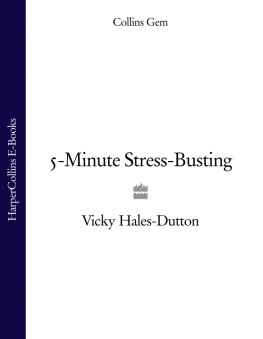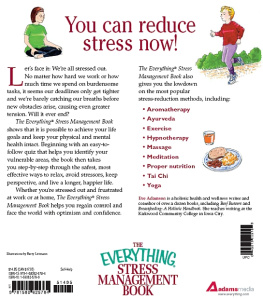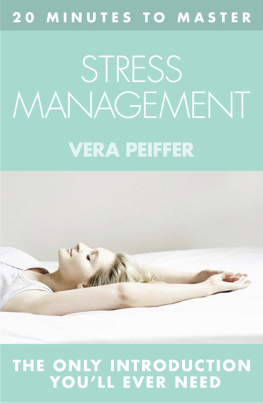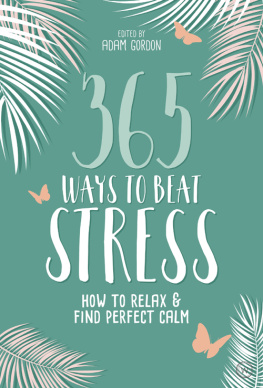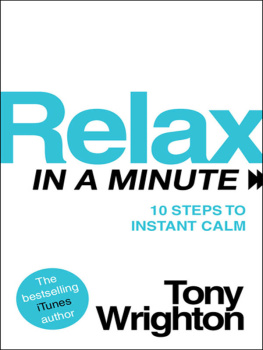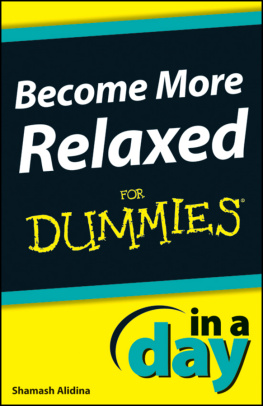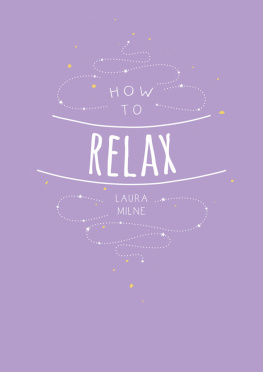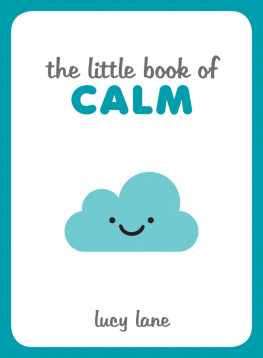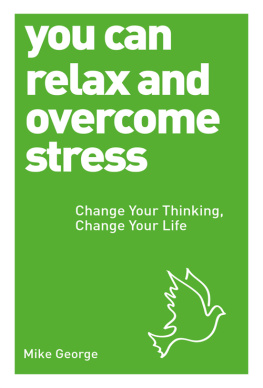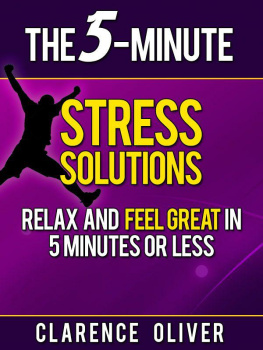SO YOU ARE FEELING STRESSED?
If feeling tense, sick with worry, or overwhelmed with work is familiar territory for you, then you know what its like to suffer with stress. Perhaps youve suffered from physical symptoms, like a persistent headache or dry mouth? Most of us struggle at times to cope with the ups and downs of daily life, and this is normal. But when stress continues over a long period, or youre dealing with life-changing events such as moving house or coping with bereavement, you need to know how to minimize your stress levels. The most important thing to remember is that youre not alone. Our fast pace of life, and the pressure to look good and be successful in everything we do, means stress is more prevalent than ever. A survey commissioned by the Samaritans found that 59% of people in the UK said they feltstressed out at least once a month. Work is partly to blame.
An international problem
According to the International Stress Management Association, 70% of adults are stressed at work. That translates into the loss of 13 million working days each year to stress, costing UK organizations 4 billion.
Although its difficult to draw like-for-like comparisons with other countries because their measurement of data can differ markedly, we do know that stress, particularly work-related stress, is an international problem.
A study entitled Work and Health in the EU A Statistical Portrait, shows that in 1999 more UK people (especially women) reported work-related stress, depression and anxiety than their European colleagues. Portugal came second, with Spanish workers the least stressed. Across the Atlantic, a 1997 survey by Yale University showed that 29% of American workers felt quitea bitorextremelystressed.
Long hours
The long hours culture doesnt help. In 2002 a survey found that the UK worked the longest hours in Europe over 43 per week, with 10 per cent of employees clocking up a 61-hour week and took the shortest holidays, with just 20 days annual leave. This compares with Europes 40-hour average working week and holidays as long as 38 days in, for example, Austria.
What is stress?
The Health & Safety Executive defines stress asthe adverse reaction people have to excessive pressure or other types of demand placed on them. Dr Chris Johnstone, author of Find Your Power, describes it as an imbalance where the demands experienced by someone exceed what they can happily cope with.
Experts agree that some pressure can be useful, spurring us on to greater achievements so we can reach our full potential. But when the pressure is too great and this varies from person to person the body cannot cope and starts to display a variety of physical and mental symptoms. This is when normal everyday pressure ends and stress begins.
The stress response is first and foremost a survival mechanism. The human body responds instinctively to danger by preparing physically and mentally for either fight or flight doing battle or running away very fast!
Fight or flight
When we are under threat our bodies release a variety of chemical messengers and hormones such as adrenaline, noradrenaline and cortisol. These act rapidly oxygen is pumped faster round our bodies and our brains and muscles get a bumper supply of blood, diverted from other areas such as digestion so that we can think and act quickly. This undoubtedly served our ancestors well in deciding whether to fight the sabre-toothed tiger or run away from it, and the physical exertion in either activity would have neutralized the effects of the chemicals and hormones in their bodies.
Our everyday worries are different now. While not immediately life-threatening, traffic jams and money problems still trigger the same chemical response as that hungry sabre-toothed tiger did all those millennia ago.
We take less exercise nowadays, so the body retains those chemicals and hormones which, admittedly, help to boost our performance in the short term. However, its when our worries persist and there is no physical outlet that stress becomes harmful.
What can we do about it?
Recognizing that a problem exists can be difficult. By reading this book you have taken the first step on your journey towards combating stress!
Theres no single, magic solution. What works for one person may not work for another. So weve included some tried and tested stress-busting techniques, practical hints and tips. Try these, even if you dont believe theyll make a difference. You could be pleasantly surprised at how much better you feel, and how quickly, too! Its your life, remember, and theres no reason why you shouldnt spend some quality time on you for a change.
This chapter examines the causes of stress, its physical, mental and emotional effects and the potential impact it has on how people behave.
THE NERVOUS SYSTEM
Lets begin with a look at the physiological origins of the stress or fight or flight response, which is the
responsibility of the bodys autonomic nervous system.
The bodys network of nerve cells carry rapid messages from one part to another about whats happening inside the body or about the outside world. The human nervous system is made up of several interconnected parts, including:

The central nervous system.

The autonomic nervous system.
1) The central nervous system comprising the brain and spinal chord, this integrates the bodys entire nervous function.
2) The peripheral nervous system its nerves gather information or transmit orders.
3) The somatic nervous system its nerves send information to the brain relating to the external environment gained via the senses.
4) The autonomic nervous system its nerves regulate the bodys internal organs, co-ordinating activities like breathing, heart rate, circulation, hormone secretion, perspiration and digestion. The autonomic nervous system is divided into the sympathetic and parasympathetic nervous systems. The sympathetic nervous system readies the body for action. The parasympathetic nervous system slows down and reduces what has been accelerated or triggered via the sympathetic nervous system, shutting off the bodys fight or flight reaction so you can relax. This is what happens when you become stressed
THE STRESS CYCLE
When people are afraid or under pressure the brains hypothalamus sends signals (via the pituitary gland) to the adrenal glands (on the kidneys). These release the hormones adrenaline, noradrenaline and cortisol into the bloodstream.
The hypothalamus is situated (with the pituitary gland) at the base of the brain. It is responsible for the overall co-ordination of hormone secretion. The adrenal gland an endocrine gland situated on top of the kidney plays a major role in the bodys short-term stress response. Its outer part (cortex) secretes hormones like cortisol, which regulates the use of carbohydrates, proteins, and fats and shuts down the immune system. Its inner section (medulla) secretes the hormones adrenaline and noradrenalin the fight or flight chemicals.
Hormones are neurotransmitters or chemical messengers that affect certain organs. The stress hormones cortisol, adrenaline and noradrenaline impact on the major organs in different ways. Long-term stress can affect the adrenals themselves. Persistent overwork because of the constant requirement for stress hormones can lead to fatigue and depression. The adrenals can eventually shut down.

